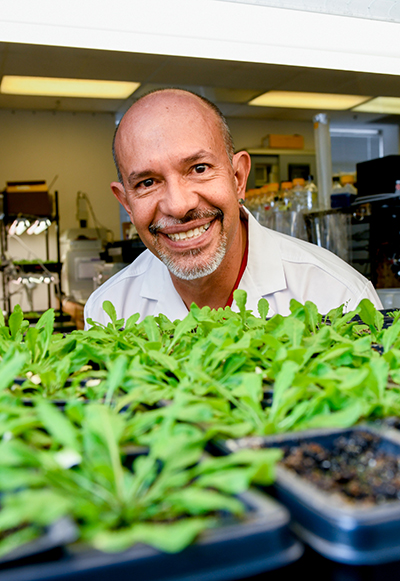
Trino Ascencio-Ibáñez was born in Guadalajara, Mexico. He earned his bachelor’s degree in biology at the Universidad Autónoma de Guadalajara before pursuing thesis work at the Center for Research and Advanced Studies, where he worked with Pseudomonas syringae pv phaseolicola and beans. Later, he spent a year at Monsanto working on the production and testing of virus-resistant transgenic potatoes. He then returned to Mexico to continue research on plant viruses and transgenic plants, focusing on geminiviruses that infect peppers.
After eight years, Ascencio-Ibáñez joined the Department of Molecular and Structural Biochemistry at NC State where he earned his Ph.D. working on a seminal paper on how the host responds to infection by geminivirus. After a couple of years as a postdoc, now he is a Teaching Associate Professor. He teaches experimental biochemistry and biochemistry of gene expression and is Director of Undergraduate Program (together with Chuck Hardin), maintaining a successful graduate and undergraduate research and training program.
Ascencio-Ibáñez’s research focuses on plant-pathogen interactions, particularly geminiviruses and potyviruses, which he takes personally since they infect tomato, tomatillo, and pepper — the main components of traditional Mexican salsa. He has research experience in Brazil, Kenya, Mexico, Spain, and Tanzania, with plans to expand into more countries in East Africa and eventually West Africa. Dr. Trino, as he is known by his students, enjoys reading, photography, mountain biking, and painting. He is also a musician-producer for two bands: a rock band, La Mansion, and a rumba flamenca group, Nomada.
Ascencio-Ibáñez and Kay Sandberg serve as Park Faculty Scholars for the Class of 2025.
What is the best part about being a professor at NC State?
The best part is the contact with the students and the energy that flows from them, but the collegiate feeling of the faculty makes it very enjoyable. It is always a challenge and an opportunity.
What is something all Park Scholars should know about you?
I am very approachable and occasionally have great ideas.
What inspired you to become a Park Faculty Scholar?
The opportunity to be engaged with future leaders.
Share a story about a Park Scholar who has inspired you.
One inspiring story is with Ian Hill ’13. I was Ian’s research advisor and he was so bright that he kept me on my toes all the time. We developed a strong relationship and are still in touch after more than ten years since he graduated. As a Park Scholar, he wrote a Park Enrichment Grant and went to a small town in Baja to help rebuild a high school chemistry laboratory — he got to meet with some of my family and I found that awesome. I miss him a lot, he made me a better person.
Which Park experience are you most excited about?
I am looking forward to the Learning Labs. I am always interested in how I can improve myself to better serve our students.
What has been the most surprising or challenging aspect of your involvement with the Park Scholarships program so far?
The intensity. I have received many emails and all of them look like something I have to do. I even started a log so I can keep up. But I am getting better at it.
What advice would you offer to Park Scholars?
Learn how to manage your time.
What is one thing someone might not know about Park Scholars?
Park Scholars are gifted, engaged, and outstanding individuals who are willing to lead, help, and deliver.
Learn more about Dr. Trino